
As the president of an international Christian missionary organization, (AOMMinistries) my passion is the study and development of Christian leaders, and as a Christian leader, there is one name that quickly comes to mind: Billy Graham.
I have had the privilege of being selected by my pastor in the 90’s many years ago to attend the one week Billy Graham School of Evangelism in Toronto, Ontario, and later to participate as a volunteer and usher at the 1998 Billy Graham Crusade in Ottawa, Ontario.[1] Though I was already a committed Christian, that particular crusade deeply changed my life, for a God dealt with me about a beautiful sister in the Lord that night, about a whole lot more than ministry and missions. That night, after the crusade, I went home, prayed all night (why ruin such a great friendship with a messed-up romance?), and the morning after, proposed to miss Karen Loyer. A year later we were married, and she is now my beautiful bride, mother of my two amazing teens, and helper and backbone of all I do in life and ministry.
Though I have never met Dr. Graham personally, I have read his books, and seen his life of incredible public ministry to both the masses, and to world leaders. Billy has met personally with seven US presidents yet has kept himself clean from scandal and compromise in every area of both public and private life and has served as a role model for millions. His three ‘G’’s for leaders still stick with me, succinctly summing up Christian leadership and character when he states:
“If you want to be successful in the ministry, you must avoid all appearance of evil in three areas: The girls, the gold, and the glory”
In HL Myra’s text, I quote: “When you hear the name Billy Graham, do you think first of his leadership. Most of us do not. We recall his preaching to vast crowds in stadiums. We see the gracious television guest, appearing with hosts from Johnny Carson and David Frost to Larry King and Barbara Walters—always responding with gentle wisdom, explaining the Gospel, but humbly admitting his own limitations. We remember his leading the nation in dramatic times of grief, or helping inaugurate presidents, but more as national pastor than leader.
Billy begins his autobiography by saying, “My responsibilities as chief executive officer of the Billy Graham Evangelistic Association have always demanded a tremendous amount of time and decision making.” [2]
So, in this paper, we look at Dr. Billy Graham as not merely a great evangelist, or even ‘America’s pastor’, rather, as a leader and CEO exemplifying courageous, integrous leadership both publicly and behind the scenes.
Though I have known of Dr. Graham for many years there have been several experiences with his organization that have helped form me as a leader.
One simple one was in speaking with some of his staff, who were jovial and yet strong. Men who could laughingly joke with you one minute, then lock eyes with you, and in a single glance, show a depth of steel, grit, and fiery resolve for the mission of Billy Graham Evangelistic Association. One such encounter seemed almost trivial at the time but has stayed with me for years.
We were having morning coffee during study break at his School of Evangelism, when I approached three older staff members who were joking around laughingly about something as I approached. Though I don’t remember their names, I remember what one older man said: “I still get picked on by these guys cause I’m the baby of the bunch around here.”
“Baby of the bunch? I enquired, “Are you related?”
All three men smiled, and the first replied: “Not really, but I’m the baby of the bunch because I’ve only been working for Billy for 23 years, these other guys have been with him much longer”
In this study, we were given the opportunity to take the ‘Big Five Personality Test’ and see how well we scored on Open-Mindedness, Conscientiousness, Extraversion, Agreeableness, Negative Emotionality. [3]
Here is a screenshot of my results, then another of Dr. Graham’s.

While it has been interesting to see how well I personally measured up on this test, for the purposes of this paper, we have been asked to critique how well a leader in our industry measures up.
I also took the time to complete one on the areas I know to be true of Dr. Billy Graham.[4] While I did not know Billy personally, I have read many of his articles, read his books, and heard him speak on countless occasions. Yet, I did not live with him, nor work for him, so I could not tell if he ever fought depression or was moody or answer truthfully about his love for art or literature. For these questions I rated him a number 3, as a middle of the road number, again, because I did not know him personally.

This his result. Billy appears to have been more open-minded than I am according to test results, and rates higher in the categories of being conscientiousness, and agreeable. I am instructed by this, as clearly these are areas I can grow in.
Clearly Dr. Graham has the personality profile of an effective leader. In the book coauthored by Harold Myra and Marshall Shelly,[5] they outline twenty-one leadership attributes of Billy Graham. If I had to pick several of these characteristics I would have to choose passion (they call it igniting), uncompromised integrity (they call it overcoming temptations), clarity of vision (they call it lasering in on the mission), overcoming betrayal (They call it experiencing trauma and betrayal), financial stewardship (They call it mobilizing money), creativity (they call it innovation), and learning from failure.
These would be my top seven choices of the twenty-one principals they outline in their book.
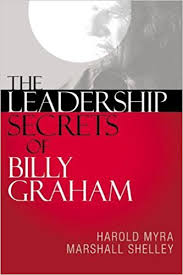
During his long lifetime, Dr. Graham faced many crisis of leadership, in which he excelled, albeit excruciatingly painfully personally. I can think of two examples of Billy Graham’s leadership in crisis that exemplify his character, courage, and strength.
The first was Billy’s personal friendship with president Richard Nixon. He was his personal confident, prayer partner, and the deciding voice that encouraged Nixon to run, and win the Presidential race.
““He not only believed in a God who could be relied on but he followed him without hesitation. From the age of 30 he knew that he was called to be a preacher of the gospel and for the rest of his long life he never turned aside from that call. That achievement is particularly remarkable because he faced trials and temptations that few of us can imagine. His success made him the focus of enormous attention.
Theologically, there were those who attacked him for being a fundamentalist and those who attacked him for betraying the fundamentals of the faith. Politically, the uncomfortably intimate linkage between Christianity and politics in the United States meant that for years there were enormous pressures for him to get involved and to speak out for either the Left or the Right.
As he became ‘America’s Pastor’, dazzling opportunities came his way. He was offered massive financial rewards for political endorsements and became the confidante and counsellor of many presidents.
Richard Nixon even offered him the post of US Ambassador to Israel; Billy turned it down. Yet he stayed faithful to the One who had called him to be a preacher of the gospel. That single-minded dedication protected him; the abundant mud slung at him never stuck and while he was occasionally singed by controversy, he was never burnt by it.”[6]
“Billy Graham’s history with Richard Nixon went far back, and it was a surprisingly close relationship.
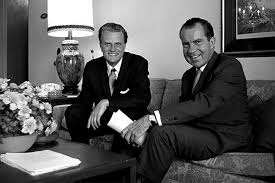
Billy built his friendship with Nixon when he was vice president under Dwight D. Eisenhower. In 1967 Nixon called Billy for advice. He wanted Billy’s opinion on making another run for the White House, so he invited Billy to join him in Florida. Nixon pressed Billy for guidance. “You still haven’t told me what to do.” He said.
“If you don’t run, you will always wonder if you should have,” Billy replied. “I will pray for you, that the Lord will give you the wisdom to make the right choice.” Later, Nixon said that Billy, more than any other individual, influenced his decision to run.
Years later, when Nixon fell, Billy’s embarrassment stung because the president had betrayed him publicly as a visible ally and privately as a close friend. The association with Nixon tarnished Billy’s ministry and legacy, and Billy wondered how he could have been so wrong about him. “Looking back these forty-five years later.” Billy wrote in his 1997 autobiography “Just As I Am “considering all that has intervened, I wonder whether I might have exaggerated his spirituality in my own mind.” He told a biographer. “I just couldn’t understand it. I still can’t. I thought he was a man of great integrity. I looked upon him as the possibility of leading this country to its greatest and best days. And all those people around him, they seemed to me so clean, family men, so clean-living. Sometimes, when I look back on it all now, it has the aspects of a nightmare.”
Talk about being refined in the furnace of leadership! The Nixon experience for Billy was the “furnace heated seven times.”
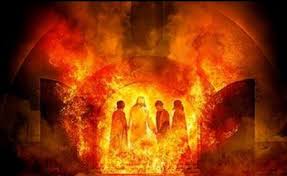
Undeterred, Ruth Graham hired an airplane to fly around Nixon’s San Clemente home towing a banner that read, “Nixon, God Loves You and So Do We.”
When Nixon died in April 1994, Billy accepted the unenviable responsibility of conducting his funeral. Once again, Billy set aside his private grief to publicly serve his friend. The eyes of the world—not to mention the eyes of Presidents Ford, Carter, Reagan, Bush, and Clinton, and their first ladies—looked to see how Billy would address Nixon’s considerable, if severely tarnished, legacy.
Billy spoke of the Nixon he had known. “There was another more personal, more intimate and more human side to Richard Nixon—that his family, neighbors, and friends that are gathered here today would know. It was a side many did not see, for Richard Nixon was a private and perhaps even a shy individual whom others sometimes found hard to get to know. There were hundreds of little things that he did for ordinary people that no one would ever know about. He always had a compassion for people who were hurting.”
Billy’s love for the man who betrayed his trust remained strong. As with many other traumas he had experienced in leading, he did not let natural reactions of self-pity or anger control his responses. Billy, in living through the nightmare had, because of the depth of his faith and commitments, once again been extruded from the furnace as a stronger leader, tempered by the fires.”[7]

He conducted Nixon’s funeral, without a note of rancor, self-pity, or ‘told you so’ attitude, bringing honor to the family, the office of the President, and the United States, with five US presidents in attendance.
He walked according a heavenly vision and mandate for no earthly leader could accomplish such forgiveness without the grace of God received through quiet, lonely anguished time on his knees before Jesus.
The second account of exceptional leadership is told in the words of TW Wilson, Billy’s right hand man and confidant. TW speaks about some of the very real dirt averted in an account recorded in J. Dennis book[8]
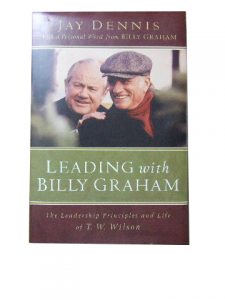
For the sake of brevity, I will recount the story in my own words. One of the moral principles Dr. Graham taught was absolute purity in relationship to members of the opposite sex. Since he often stayed in hotels around the world, there was always the very real temptation of extra-marital affairs. To prevent this he, and all of his staff were never allowed to be alone in even an elevator with a member of the opposite sex or hotel room. Like Jesus, they went everywhere two by two.[9] (And he called unto him the twelve, and began to send them forth by two and two; Mark 6:7 KJV)
In one particular instance some criminal element tried to create a scandal by hiring prostitutes and photographers and sneaking naked ladies into Billy’s room while he was at the crusade preaching. When TW Wilson entered the room ahead of Billy and saw the trap set, he was able to yell, ‘Billy stay out!’, then tackled the photographer and throw the women out of the room before they could get their fake scandal.
As I look at my own personal journey in leadership, in comparison to Dr. Graham’s, I cannot help but think of the quote by John Maxwell – “Leadership is influence, if you think you are leading and no one is following, you are just taking a walk”[10] While I continue to develop in my private life in prayer before the throne of God, and in continual study and pursuit of excellence, I am not yet at the public level of influence of Billy Graham, perhaps I never will be, yet I am faithful to God, my family, my responsibilities, and this nation, determined to walk an example of godly leadership everywhere I am given the opportunity.
I have not met with Presidents, although I did have the privilege of spending several hours with governor Susan Martinez of New Mexico, chatting about our ministry to the Navajo and the reconciliation service I helped organize and lead to Window Rock, AZ in 2014.

For this event, we had fifty seven native American tribes represented, as veterans gave a combat medal and marine corps combat knife as honor gifts to the Navajo (Dine’) people, and prayed that there could be forgiveness, reconciliation and healing between the United States and the Navajo people for the historical atrocities committed through the long walk of the Navajo and the broken treaties and promises of the US Federal government towards the tribe.
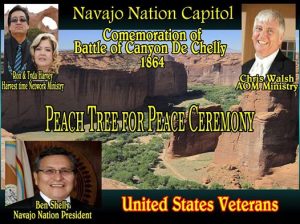
A Garden of reconciliation was donated and constructed, complete with an outdoor stage and amphitheater, and thousands of people across America contributed prayer, time, construction materials or finances to make this project happen.[11]
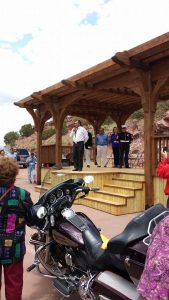
I am not Billy Graham, I am Chris Walsh. Much of my work is done in jeans, in sweat and sacrifice, as I struggle to build things and create projects of value for this nation, and for those in great need of humanitarian aid. (primarily orphans).
Billy had two things going for him that I have not: the support of his family, and more time. Yet, I’m only 56, he died at age 99, and I am not done yet. I will continue to build, lead, learn, apply, network, and grow AOMMinistries as the Lord gives me strength, ability and resource.
In conclusion I see Billy Graham as a great example of leadership, through whatever grid of measure one might define his life and example. I end with the following quote:
“Strawbridge (2009) sums up her position well: Mission does not happen until the leader knows what it means to embody Christ and is already on the path of faith to which others
are invited and are empowered to join. This leadership is grounded in the life, death, and resurrection of Christ to such a depth that others are moved to embrace and embody the gospel in their own lives. A theology of leadership is not complex. It is comprehensive,
but in the end, based upon the mission of the gospel and the power of God, leadership is rather simple. (p. 74)”[12]
References:
- Myra, H. L., & Shelley, M. (2005). The leadership secrets of Billy Graham. Harper Collins.
- Dennis, J. (2005). Leading with Billy Graham: The Leadership Principles and Life of TW Wilson. Baker Books.
- Resick, C.J., Hanges, P.J., Dickson, M.W. et al. J Bus Ethics (2006) 63: 345. https://doi.org/10.1007/s10551-005-3242-1
- Wofford, J. C. (1999). Transforming Christian leadership: 10 exemplary church leaders. Baker books.
- Huizing, R. L. (2011). Bringing Christ to the table of leadership: Moving towards a theology of leadership. The Journal of Applied Christian Leadership, 5(2), 58.
- Maxwell, J. C. (1998). The 21 irrefutable laws of leadership: Follow them and people will follow you. Nashville, Tenn.: Thomas Nelson.
[1] Billy Graham 1998, Ottawa, ON http://web.ncf.ca/dq579/bgrahamottawa.html
http://www.christianitytoday.com/ct/1998/august10/8t9017.html
[2] Myra, H. L., & Shelley, M. (2005). The leadership secrets of Billy Graham. Harper Collins.
P11
[3] Big Five Test:
[4] https://www.outofservice.com/bigfive/results/?o=75,100,100&c=100,100,100&e=100,100,100&a=100,100,100&n=31,0,63&y=1960&g=m
[5] Myra, H. L., & Shelley, M. (2005). The leadership secrets of Billy Graham. Harper Collins.
[6] https://www.premierchristianity.com/Blog/3-important-lessons-from-the-life-of-Rev-Billy-Graham
[7] Myra, H. L., & Shelley, M. (2005). The leadership secrets of Billy Graham. Harper Collins.
P178-182
[8] Dennis, J. (2005). Leading with Billy Graham: The Leadership Principles and Life of TW Wilson. Baker Books.
[10] Maxwell, J. C. (1998). The 21 irrefutable laws of leadership: Follow them and people will follow you. Nashville, Tenn.: Thomas Nelson.
[11] https://www.youtube.com/watch?v=E5pO_8gzR6s
- [12] Huizing, R. L. (2011). Bringing Christ to the table of leadership: Moving towards a theology of leadership. The Journal of Applied Christian Leadership, 5(2), 58.


